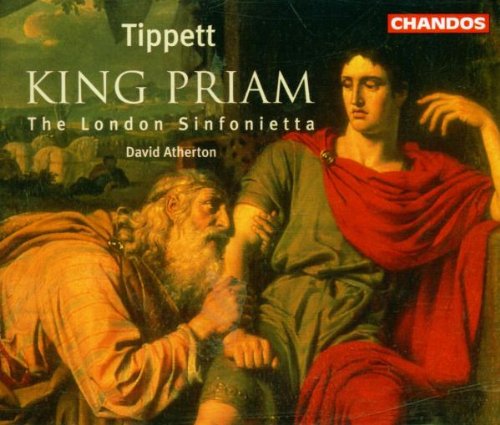Tippett King Priam
View record and artist detailsRecord and Artist Details
Composer or Director: Michael Tippett
Genre:
Opera
Label: London
Magazine Review Date: 1/1990
Media Format: CD or Download
Media Runtime: 128
Mastering:
DDD
Catalogue Number: 414 241-2LH2

Tracks:
| Composition | Artist Credit |
|---|---|
| King Priam |
Michael Tippett, Composer
Ann Murray, Nurse, Mezzo soprano David Atherton, Conductor David Wilson-Johnson, Old Man, Tenor Felicity Palmer, Andromache, Soprano Heather Harper, Hecuba, Soprano Julian Saipe, Paris, as a boy Kenneth Bowen, Hermes, Tenor Linda Hirst, Serving woman, Soprano London Sinfonietta London Sinfonietta Chorus Michael Tippett, Composer Norman Bailey, Priam, Baritone Peter Hall, Young Guard, Tenor Philip Langridge, Paris, Tenor Robert Tear, Achilles, Tenor Stephen Roberts, Patroclus Thomas Allen, Hector, Baritone Yvonne Minton, Helen, Soprano |
Author: Arnold Whittall
Even if this recording were technically flawed in a dozen ways the quality of the performance and the power of the work itself would still shine through. Tippett's second opera, like Britten's War Requiem, with which it is exactly contemporary, is a searing, unanswerable indictment of violence and militarism, and King Priam is the more disturbing for focusing so starkly on family tragedy and the seeming irrelevance of belief in the gods.
David Atherton is the ideal conductor for a score which requires a firm hand on the work's succession of distinct formal units—they could easily disintegrate into a formless jumble—while not damping down the raw emotions that erupt and accumulate greater and greater tension as the opera proceeds. Atherton ensures that nothing is exaggerated, nothing underplayed, and he has superb support from the London Sinfonietta and a fine cast, with Norman Bailey and Robert Tear particularly well contrasted in their complementary states of anguish and resolution. If the purely musical highlight of the recording is Achilles's song with guitar in Act 2 this is because Tippett pours so much exalted, tortured lyricism into it, a lyricism which Tear seizes on and brings powerfully to life. Yet Priam's long scene of self-examination in Act 3 is no less moving, especially in the King's final exchanges with the nurse, voiced with surpassing sensitivity by Bailey and Ann Murray.
With no weak links this set offers British opera singing at its early-1980s best. But it is for the music itself, so concentrated yet so untrammelled in its expressive force, that this set should be heard and reheard. The recording is admirable. Maybe as JW observed in reviewing the LPs, the balance could in places have more closely mimicked the perspectives you might expect in the theatre, but to my ears the dramatic impact achieved here, especially at the end of Act 2, with Achilles's voice arching horrifically over orchestra and chorus, is greater than at any staged performance I've attended. Without doubt this is something exceptional, and if you don't already have the LPs you should buy the CDs without hesitation. At the same time, you might drop a note to Decca urging them to record Tippett's two later operas, The Ice Break and New Year, and thereby close one especially regrettable gap in the Tippett catalogue.'
David Atherton is the ideal conductor for a score which requires a firm hand on the work's succession of distinct formal units—they could easily disintegrate into a formless jumble—while not damping down the raw emotions that erupt and accumulate greater and greater tension as the opera proceeds. Atherton ensures that nothing is exaggerated, nothing underplayed, and he has superb support from the London Sinfonietta and a fine cast, with Norman Bailey and Robert Tear particularly well contrasted in their complementary states of anguish and resolution. If the purely musical highlight of the recording is Achilles's song with guitar in Act 2 this is because Tippett pours so much exalted, tortured lyricism into it, a lyricism which Tear seizes on and brings powerfully to life. Yet Priam's long scene of self-examination in Act 3 is no less moving, especially in the King's final exchanges with the nurse, voiced with surpassing sensitivity by Bailey and Ann Murray.
With no weak links this set offers British opera singing at its early-1980s best. But it is for the music itself, so concentrated yet so untrammelled in its expressive force, that this set should be heard and reheard. The recording is admirable. Maybe as JW observed in reviewing the LPs, the balance could in places have more closely mimicked the perspectives you might expect in the theatre, but to my ears the dramatic impact achieved here, especially at the end of Act 2, with Achilles's voice arching horrifically over orchestra and chorus, is greater than at any staged performance I've attended. Without doubt this is something exceptional, and if you don't already have the LPs you should buy the CDs without hesitation. At the same time, you might drop a note to Decca urging them to record Tippett's two later operas, The Ice Break and New Year, and thereby close one especially regrettable gap in the Tippett catalogue.'
Discover the world's largest classical music catalogue with Presto Music.

Gramophone Digital Club
- Digital Edition
- Digital Archive
- Reviews Database
- Full website access
From £8.75 / month
Subscribe
Gramophone Full Club
- Print Edition
- Digital Edition
- Digital Archive
- Reviews Database
- Full website access
From £11.00 / month
Subscribe
If you are a library, university or other organisation that would be interested in an institutional subscription to Gramophone please click here for further information.




